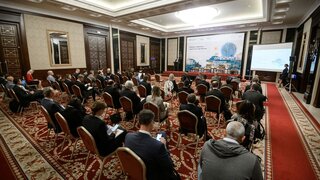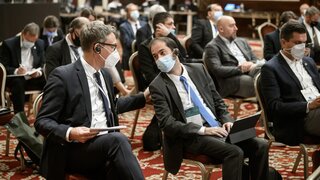High-level delegation visit to Ukraine led by State Secretary Andreas Feicht
From 13-17th September 2021, a high-level delegation from the German Federal Ministry for Economic Affairs and Energy (BMWi) visited Kyiv under the auspices of the German-Ukrainian Energy Partnership (EP).
The delegation from BMWi, accompanied also by representatives of other German ministries, was led by State Secretary Andreas Feicht, who has been a key figure in building a strong relationship with Ukraine on bilateral energy cooperation, the transition to green energy and Ukraine’s integration into European energy markets.
In the course of the visit, State Secretary Feicht held several meetings with high-ranking representatives of the Ukrainian Government, participated in joint events of the Energy Partnership and also met with civil society organizations (CSOs), and private sector representatives in the energy and environment areas.
A subject of particular interest was Ukraine’s possible future role as a producer and exporter of green hydrogen.
Ukraine has emerged as a potential key partner for the prospects of sustainable hydrogen production and exports, and this has become a vital point of cooperation within the German-Ukrainian EP. Ukraine is currently developing its own Hydrogen Strategy and the German Federal Government has already approved a directive on the provision of support for hydrogen projects of mutual interest in third countries, based on the hydrogen policy adopted in 2020.
The panel discussion “Ukraine: The Prospects for Green Hydrogen Exports to Germany & the EU”, organised jointly by BMWi, the German Energy Agency (dena) and GIZ and held under the umbrella of the EP, was a multi-stakeholder event with a unique setting for in-depth discussions.
Andreas Feicht stressed that Germany would seek reliable international partners in countries with high renewable energy potential for green hydrogen production. He encouraged Ukraine to use its competitive advantages: its abundant green energy potential, its extensive pipeline network geographically reaching Southern Germany, Austria and Italy, capable of meeting the large industrial demand.
The Ukrainian side – represented by Deputy Energy Ministers Yaroslav Demchenkov and Yulia Pidkomorna – in return underlined the willingness of their administration to support the scale-up of a national hydrogen economy. The Ukrainian hydrogen strategy currently under development will provide clear guidelines and help to further structure the process.
During the discussion also including Torsten Wöllert, Energy Counsellor at the EU Delegation in Ukraine, it became clear that the process is still in its initial stage on “both ends of the pipeline” and will require substantial efforts in the fields of standardisation, domestic market development and technical infrastructure development including renewable energy capacities.
During the meeting of the Hydrogen Working Group following the panel discussion, the Ukrainian and German sides continued negotiations in a smaller circle. WG members used the opportunity to discuss current activities, work plans and priorities for the future cooperation between Germany and Ukraine on hydrogen.
The final meeting of the EPs Steering Committee (SC) provided an opportunity for both German and Ukrainian stakeholders, including Minenergo, Minregion, Mineco, BMU, BMZ and several government agencies, summarised the results of the first year of the EP. The SC is the main platform of the Energy Partnership to shape the directions of bilateral energy cooperation between the two countries. Following reflections of the achievements made, the Co-Chairs of the five Working Groups, namely on Energy Efficiency, Decarbonisation, Just Transition/Transformation of Coal Regions, Renewables and Hydrogen were given the floor to identify common priorities for sectoral cooperation.


